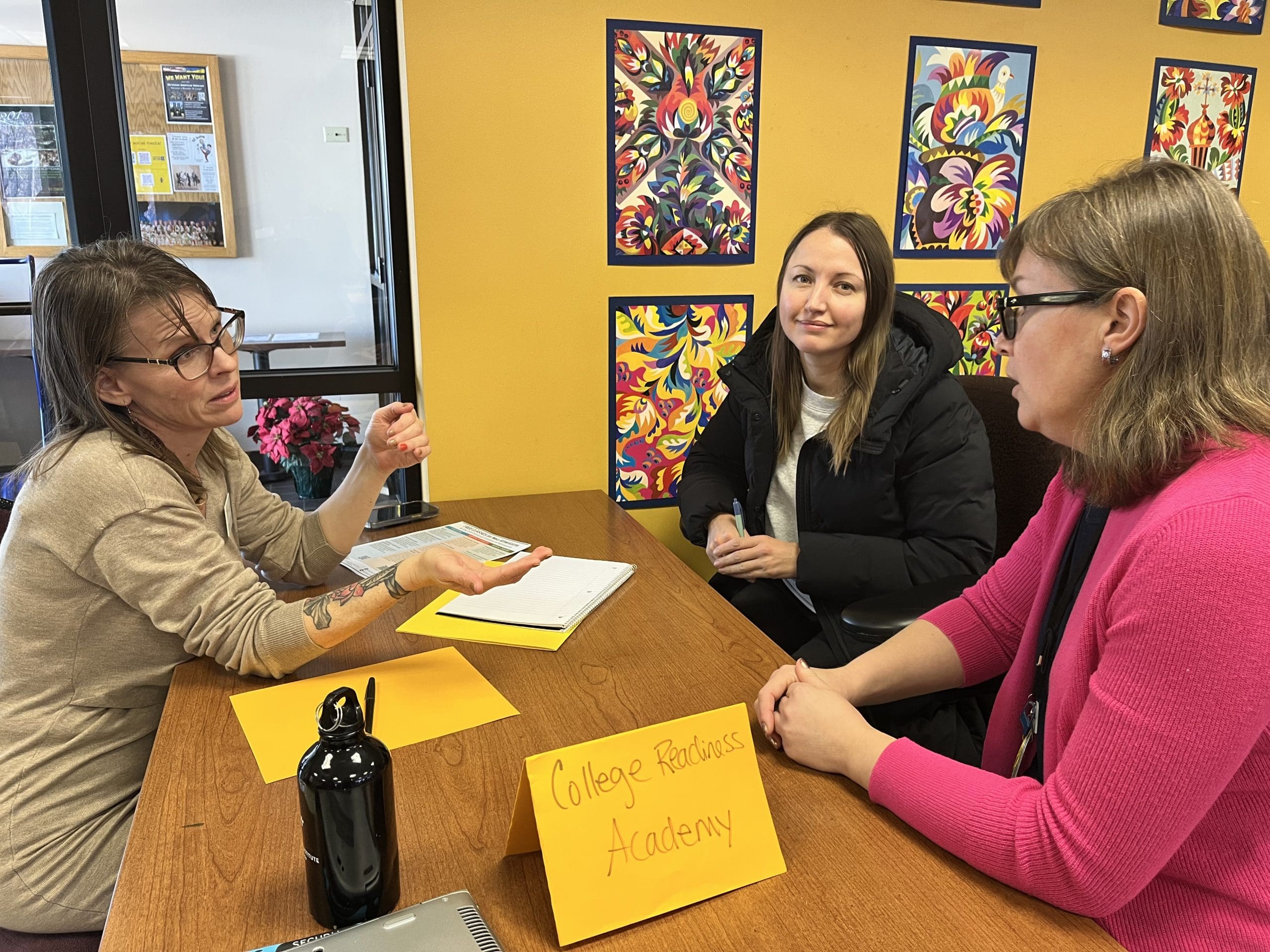Announcement
One Year Later: Support for Ukrainians

February 14, 2023 | Since the Russian invasion of Ukraine in February 2022, more than six million Ukrainians have fled their country. Staff at the International Institute of Minnesota have been pillars of support as the number of Ukrainian arrivals increased throughout the year.
Our English classes and College Readiness Academy welcomed new arrivals at all levels of English proficiency. We hired new staff to provide resources and guidance, created new partnerships with organizations like the Ukrainian American Community Center, and provided Community Orientation Workshops specific to new Ukrainian arrivals.
With your support, our dedicated, expert staff has the ability to continue providing these essential services as the war persists.
Give today
The pivotal first months
Learning how to navigate the systems of a new country is never an easy task. That difficulty is compounded when those fleeing war don’t know how long they’ll stay.
Fahima Dawid, Ukraine Case Manager, is there for her clients during the difficult and stressful process of setting up their lives here — even if only temporarily. She refers her clients to different programs, helps them apply for assistance and resources that provide healthcare, benefits, legal aid and employment. The success of their first few months here are pivotal toward building self-sufficiency, she says.
Fahima sees daily the resilience of her Ukrainian clients.
“I feel like they give me motivation, seeing how resilient they are…They are all go getters,” she says.
She shares a story about one Ukrainian family she recently helped: They bought a car and when the car needed extensive repairs, the community rallied together to help them. The father and his friends watched YouTube and learned how to fix the car on their own.
“They motivate me and inspire me as well. I feel happy being able to help in any way that I can,” Fahima says.
Finding support in the classroom
As many Ukrainians search for a place to learn or improve their English skills, they discover a “place of purpose” in the classroom, says Stacey Dietrich Varney, Languages Program Manager.
With a mix of students from all over the world — each with various levels of English skills — teachers adapt the content as needed to make sure the teaching materials are culturally matched and sensitive to each student’s experiences.
Stacey shares a story of one Ukrainian family that was struggling to adjust to life in Minnesota. The Institute was a place of comfort, safety and support for them, providing resources and flexibility as they navigated the process of applying for essential services.
She referred the family to the Ukrainian American Community Center, where the Institute also teaches Community Orientation Workshops. Taking the workshops helped the family reduce stress and establish a community in Minnesota.
Building community
Kaija Bergen, an Institute Community Orientation Workshop instructor, provides essential information as people transition to life in Minnesota. With interactive teaching and lively conversation, students learn about topics such as:
- money and finances
- housing
- health insurance
- education
- employment
Classes are held every Friday morning at the Ukrainian American Community Center (UACC), in addition to the Community Orientation Workshops offered to all new arrivals at the Institute.
Students also connect to each other during class, discussing fun things to do in the cities, such as going to Como Conservatory or attending the Winter Carnival, helping them find activities they enjoy.
“There’s a difference between getting the logistics of your life sorted, and also living your life,” Kaija says. Our Community Orientation workshops give Ukrainians the tools to do both.
Continued education
Ukrainians who arrive in Minnesota with higher levels of education and English skills are often seeking guidance from the Institute about how to continue on their chosen career path or further their education. The Institute’s College Readiness Academy helps them explore and pursue options.
Many Ukrainian students were forced to pause their schooling when the war began. Now, they’re looking for ways to continue their education. The Institute’s College Readiness Academy navigators advise students on logistics of the higher education system, including applications, financial aid and academic planning.
“Knowing the system, the steps and the process helps them get clarity,” says Jamie Wright, a College Readiness instructor. As colleges and universities adjust to the arrival of Ukrainian students, the Institute’s College Readiness Academy is a place of support and advocacy for students figuring out their paths.
Jamie also helps her students build knowledge, skills and confidence in academic writing, reading and speaking. The class provides students an opportunity to be in a college level course. The goal is to ensure that students are prepared for any subject matter they might encounter in their college programs.
One student is currently finishing her degree online at a Ukrainian university. She is taking the class in preparation to pivot to school in Minnesota. The Institute’s navigators are currently working with her as she applies to universities.
Minnesotans respond with compassion and support
In Minnesota, Ukrainians have found safety and a place to call home for as long as needed. And at the Institute, they find refuge and support during this very difficult time. Help from the community – in the form of volunteer time, financial contributions and donation drives – makes these programs and services possible.
Reported and written by Zinzile Sibanda, Marketing and Communications Coordinator at the International Institute of Minnesota. She moved to Minnesota from Zimbabwe in 2014 to pursue an undergraduate degree at Hamline University, where she majored in Political Science and Economics with a minor in Women’s Studies. Her journey from student to immigrant has influenced her passion for working with immigrants and refugees and the importance of community building.